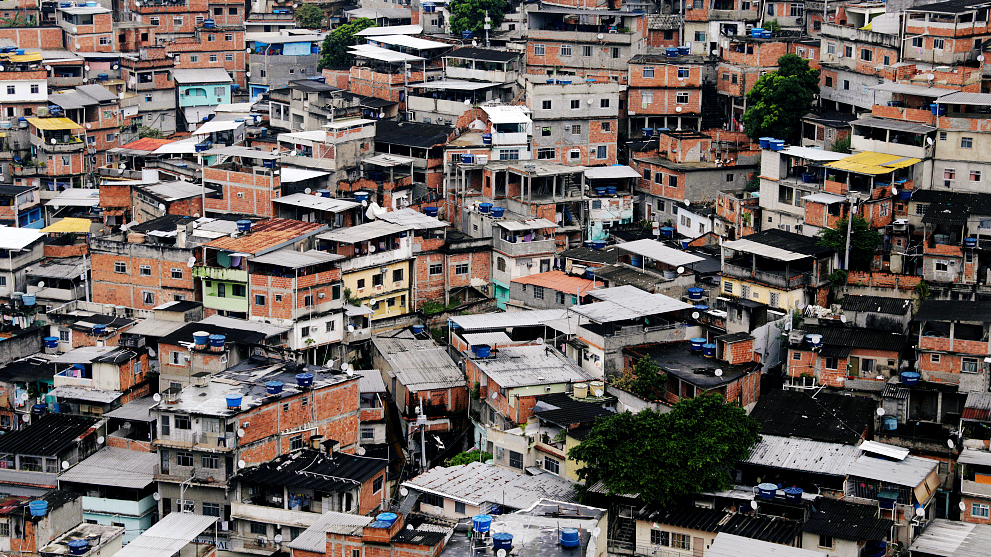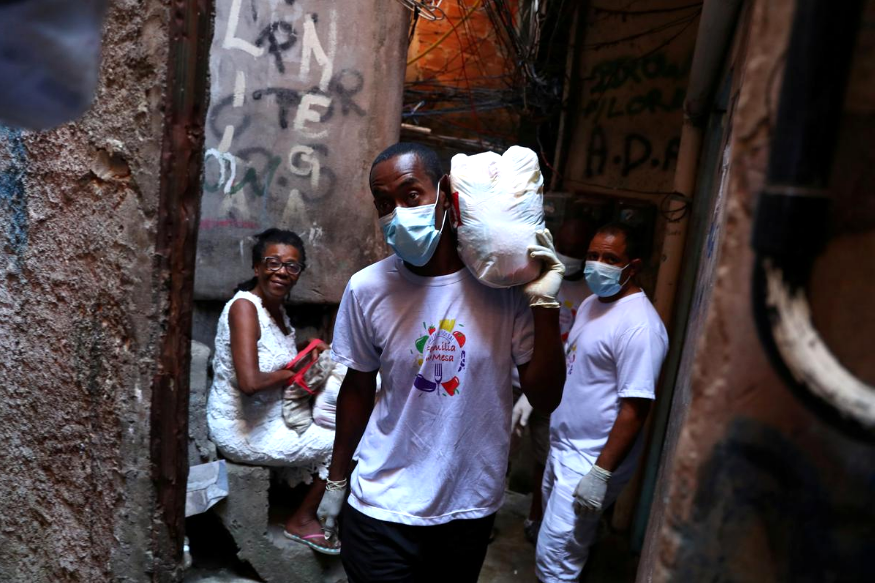
A general view of Alemao slums complex in Rio de Janeiro, Brazil March 22, 2020. Picture taken March 22, 2020. /VCG
A general view of Alemao slums complex in Rio de Janeiro, Brazil March 22, 2020. Picture taken March 22, 2020. /VCG
Editor's note: Stephen Ndegwa is a Nairobi-based communication expert, lecturer-scholar at the United States International University-Africa, author and international affairs columnist. The article reflects the author's opinions and not necessarily the views of CGTN.
The World Habitat Day (WHD) 2020 being marked today would not have come at a more opportune moment. The coronavirus pandemic has made our procrastination in tackling the problems hindering human development all too apparent.
The theme for this year's WHD, "Housing For All – A Better Urban Future," is aptly captured in the message by the United Nations Secretary-General António Guterres: "The urgency of improving living conditions has been brought to the fore by COVID-19, which has devastated the lives of millions in cities. Access to clean water and sanitation, along with social distancing, are key responses to the pandemic. Yet in slums it has proved difficult to implement these measures. This means an increased risk of infection, not only within slums, but in whole cities."
Since January when the World Health Organization declared COVID-19 a pandemic of global proportions, millions of people hibernated in their homes, many of them in their abodes in towns and cities. In 2018, it was estimated that 4.2 billion people, equal to 55 percent of the world's population, lived in cities.
While the rich have generally been comfortable in their modern homes, it was double jeopardy for the poor. Ironically, most of the upmarket residential places in developing countries are bordered and surrounded by vast slums. The latter are home to more than 828 million people, and counting as millions make their way to towns and cities in search of livelihoods every year. Cities generate about 80 percent of global gross domestic product.
Housing is one of the most important building blocks of people's health, dignity, safety, well-being and inclusion. It is a basic human right that every government needs to honor in its development plan. The sector is covered under Goal 11 of the UN Sustainable Goals, which aims at making cities and human settlements inclusive, safe, resilient and sustainable.
Often, cities and towns do not want the rest of the world to see their real picture. Through the media and other marketing channels, cities project rosy narratives in order to attract investors and tourists. But these picture-perfect images have their converse ugly side that authorities wish away.

A volunteer carries donated aid for poor families at the Rocinha slum as the coronavirus disease (COVID-19) outbreak continues in Rio de Janeiro, Brazil, March 27, 2020. /Reuters
A volunteer carries donated aid for poor families at the Rocinha slum as the coronavirus disease (COVID-19) outbreak continues in Rio de Janeiro, Brazil, March 27, 2020. /Reuters
A quarter of all urban residents live in slums and other informal settlements. According to UN Habitat, there are currently one billion people living in overcrowded settlements with inadequate housing, a number that is predicted to reach 1.6 billion people by 2030. Now, to bridge this massive gap means that we must build 96,000 housing units every day. An impossible task, perhaps?
Indeed, the challenge goes further. It is one thing to build the houses, but another to offer efficient services and install adequate facilities that make these structures comfortable. This includes energy, water and sanitation. Secondly, once constructed, how affordable would these houses be to the millions of urban poor currently squeezed in shanties?
The other issue is identifying whose responsibility it is to upgrade housing for the poor in urban centers and cities. The conflict between county or local governments and national governments has led to wastage of both time and resources. But the net of consultation must be cast wider to include all key stakeholders in order to ensure that the numerous interests in the sector are catered for.
Most of the challenges encountered in efforts to modernize human habitats are toughest mainly in the developing world. This is due to the thin spread of finances that is hardly adequate even for the most pressing needs. But a way around this needs to be found, which means that authorities will have to be more creative in the way they make cities the next frontier in human habitat.
Although it has devastated social and economic lives of millions globally, COVID-19 is a silver lining in the search for both urban rejuvenation and growth. It has exposed the social injustice faced by those who now live on the precipice due to loss of livelihoods.
Still, the pandemic has shown that there is still hope for humanity. Simple, kind gestures between neighbors and across the class or economic strata have been invaluable in enhancing the resilience of society. If the solidarity that has arisen between the poor and the rich when faced by an insurmountable challenge like COVID-19 was permanent, there would be a high level of equity in people's standards of living.
As the world works tirelessly towards curbing the pandemic, it is time to address the factors that makes the housing system fragile and unequal to some people and not others. In addition, this is the time to harness the transformative potential of urbanization for the benefit of the planet and its entire population.
(If you want to contribute and have specific expertise, please contact us at opinions@cgtn.com.)